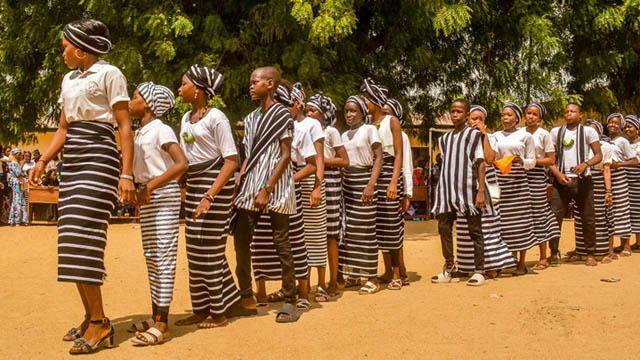Uncover Ghana’s Cultural Treasures: Unveiling the Fabric of Marriage, Dance, Festivals, and More
Table of Contents
Introduction
Ghana, a vibrant nation nestled in West Africa, boasts a rich cultural tapestry that has captivated the hearts of travelers for centuries. From the intricate rituals of marriage to the pulsating rhythms of traditional dance, Ghana’s cultural heritage offers a interesting glimpse into a vibrant and dynamic society.in this article, we delve into the heart of Ghana’s cultural treasures, exploring the customs, celebrations, and artistic expressions that define this remarkable country.
Marriage: A Tapestry of Traditions
Marriage in Ghana is not merely a union between two individuals; it is a sacred bond that interweaves families and strengthens community ties. The institution of marriage is steeped in ancient traditions that vary from ethnic group to ethnic group.
Courtship and Engagement: The courtship process in Ghana is a delicate dance of courtship and familiarity. Families frequently enough play a pivotal role in matchmaking,facilitating introductions and exchanges of presents between potential spouses. Once a relationship is established,a formal engagement ceremony is held where the groom’s family presents to the bride’s family gifts that symbolize their commitment and intentions.
Traditional Marriage Ceremonies: Traditional marriage ceremonies in Ghana are elaborate affairs that can last for days. The rituals and celebrations vary depending on the region, but common elements include:
- Knocking on the Door: The groom’s family knocks on the door of the bride’s family, requesting permission to marry her.
- Pouring of Libation: Libation, a symbolic offering of alcohol or water to the ancestors, is performed to seek their blessings and protection.
- exchange of Gifts: The exchange of gifts between the two families is customary, symbolizing the official union of the clans.
Modernization of Marriage: While many Ghanaians still adhere to traditional marriage practices, there has been a growing trend towards modernized marriages. Couples may opt for civil ceremonies or combine traditional and Western elements, reflecting the evolving nature of Ghanaian society.
Dance: The Rhythm of the Soul
Dance is ingrained in Ghana’s cultural identity. From the energetic rhythms of the Ewe people to the graceful steps of the Ashanti, dance is a way of life, expressing emotions, preserving history, and connecting with ancestors.
Traditional Dances: Ghana is renowned for its vibrant traditional dances, each with its unique choreography, costumes, and importance:
- Adowa: A stately Ashanti dance performed by women, characterized by intricate footwork and vibrant costumes.
- Kete: A high-energy dance from the Volta Region, known for its energetic steps and polyrhythmic drumming.
- Damba: A Dagomba dance performed during the annual Damba festival, featuring elaborate costumes and rhythmic foot stamps.
Contemporary Dance: Ghana’s modern dance scene is thriving, with contemporary choreographers blending traditional elements with contemporary influences. Dancers experiment with new rhythms, styles, and themes, creating innovative works that reflect the evolving cultural landscape.
festivals: Celebrations of Tradition and Identity
Festivals are an integral part of Ghana’s cultural calendar, providing a platform for communal gatherings, showcasing traditional customs, and sharing history.
Major Festivals: Ghana’s most notable festivals include:
- Homowo: Held by the Ga people of Greater Accra Region, Homowo is a thanksgiving festival that honors ancestors and celebrates the harvest.
- Odwira: A festival observed by the Akwapim and Akuapem people, Odwira is a time for purification, reconciliation, and the commemoration of past events.
- Damba: A festivity in the Northern Region, Damba showcases Dagomba culture thru dance, music, and traditional festivities.
Significance of Festivals: Festivals in Ghana serve as a time to:
- Honor ancestors and reaffirm communal ties
- celebrate traditional culture and heritage
- Showcase artistic expressions and local crafts
- Promote goodwill and unity within the community
Other Cultural Treasures:
artistic crafts: Ghana is renowned for its skilled artisans, who produce exquisite crafts including wood carvings, woven textiles, pottery, and jewelry.
Music: Ghana’s musical landscape is rich and diverse, featuring traditional instruments like the drums, flutes, and xylophones. Highlife music, a popular genre with roots in the 1920s, continues to captivate audiences.
Storytelling and Folktales: Storytelling is an integral part of Ghana’s cultural heritage, with captivating folktales passed down through generations. These stories often convey moral lessons, historical events, or cultural beliefs.
Case Studies: The Power of Cultural Heritage
The Dondo Drummers: the Dondo drummers of Ghana are a renowned drumming group that has captivated audiences around the world.Their performances preserve and promote the traditional rhythms and dances of the Ewe people.
The Dagomba Cultural Museum: Located in Tamale, the Dagomba Cultural museum exhibits historical artifacts, traditional crafts, and artwork, offering visitors a glimpse into the rich heritage of the Dagomba people.
First-Hand Experience: My Journey into Ghanaian Culture
As a visitor to Ghana, I had the privilege of immersing myself in the country’s vibrant culture. I witnessed the beauty of traditional dances, attended a colorful festival, and engaged in conversations with locals who shared insights into their customs and beliefs. the warmth and hospitality of the Ghanaian people left an unforgettable mark,making my journey truly enriching.
Conclusion
Ghana’s cultural treasures are a testament to its rich history, diverse ethnic groups, and enduring traditions. From the sacred rituals of marriage to the vibrant beats of dance and the lively festivities of festivals,Ghana’s cultural heritage invites us to explore a world of ancient customs,artistic excellence,and communal bonds. As we continue to unravel the fabric of Ghanaian culture, we gain a deeper gratitude for the timeless traditions that continue to shape the identity of this remarkable nation.

